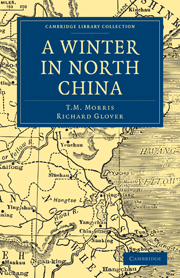Book contents
- Frontmatter
- INTRODUCTION
- AUTHOR'S PREFACE
- MAP OF THAT PART OF CHINA VISITED BY DR. GLOVER AND THE REV. T. M. MORRIS.
- Contents
- CHAPTER I FROM SAN FRANCISCO TO YOKOHAMA
- CHAPTER II CHEFOO AND TIEN-TSIN
- CHAPTER III FROM TIEN-TSIN TO TSING-CHOW-FU
- CHAPTER IV TSING-CHOW-FU
- CHAPTER V CHOW-PING
- CHAPTER VI CHI-NAN-FU
- CHAPTER VII THE GREAT PLAIN OF CHINA
- CHAPTER VIII T'AI-YUEN-FU
- CHAPTER IX PEKING
- CHAPTER X AN INTERVIEW WITH LI-HUNG-CHANG
- CHAPTER XI SHANGHAI
- CHAPTER XII HANKOW, HONG-KONG, AND CANTON
- CHAPTER XIII THE RELIGIONS OF CHINA
- CHAPTER XIV FUNG-SHUI
- CHAPTER XV MISSIONARY WORK AND METHODS IN CHINA
- APPENDIX
CHAPTER X - AN INTERVIEW WITH LI-HUNG-CHANG
Published online by Cambridge University Press: 05 August 2011
- Frontmatter
- INTRODUCTION
- AUTHOR'S PREFACE
- MAP OF THAT PART OF CHINA VISITED BY DR. GLOVER AND THE REV. T. M. MORRIS.
- Contents
- CHAPTER I FROM SAN FRANCISCO TO YOKOHAMA
- CHAPTER II CHEFOO AND TIEN-TSIN
- CHAPTER III FROM TIEN-TSIN TO TSING-CHOW-FU
- CHAPTER IV TSING-CHOW-FU
- CHAPTER V CHOW-PING
- CHAPTER VI CHI-NAN-FU
- CHAPTER VII THE GREAT PLAIN OF CHINA
- CHAPTER VIII T'AI-YUEN-FU
- CHAPTER IX PEKING
- CHAPTER X AN INTERVIEW WITH LI-HUNG-CHANG
- CHAPTER XI SHANGHAI
- CHAPTER XII HANKOW, HONG-KONG, AND CANTON
- CHAPTER XIII THE RELIGIONS OF CHINA
- CHAPTER XIV FUNG-SHUI
- CHAPTER XV MISSIONARY WORK AND METHODS IN CHINA
- APPENDIX
Summary
After a very pleasant stay in Peking we set out on our way once again on Saturday, March 21. We started on that day in order that we might spend a Sunday at Tung-Chow, an important mission station of the American Board. Tung-Chow, which is really the port of Peking, is a large and important place, with a population of 100,000. It is on the Peiho, and an immense quantity of merchandise is brought up as far as this by Chinese boats of small draught and considerable burden. The goods are here unshipped, and conveyed by cart, barrow, and otherwise to Peking, over the stone road. Persons travelling between Tung-chow and Tien-tsin usually travel by the house-boats, which in large numbers ply on this part of the river.
It is a very important mission centre, in connection with which a large and varied work is carried on. There is a theological school, or college for the training of young men for the ministry, boys' and girls' schools, daily preaching in the street chapel, and a very good work among the women. The educational work is that for which this mission is chiefly distinguished—it is the educational centre of the American Board's Mission in North China. The last report of the American Board, speaking of the educational work at this station, says, ‘We may hope to raise up a body of educated, clever young men, as preachers and teachers, fitted for any of the emergencies of the Church of Christ in China in the future.’
- Type
- Chapter
- Information
- A Winter in North China , pp. 157 - 167Publisher: Cambridge University PressPrint publication year: 2010First published in: 1892



